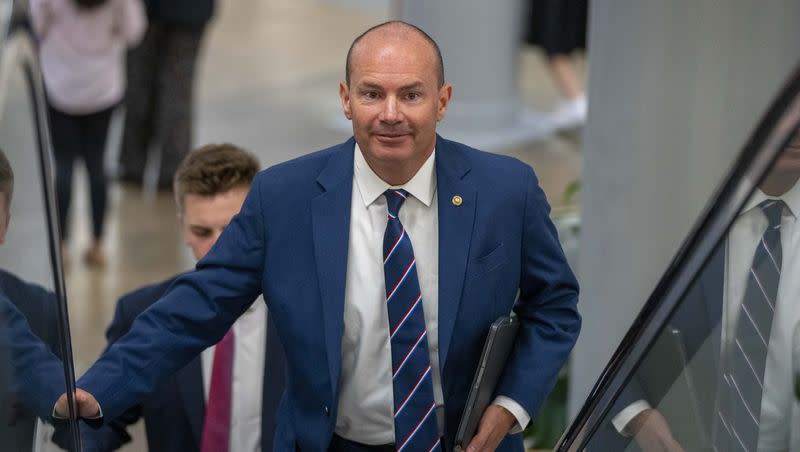Federal budget deficit set to double in 2023 — Sen. Mike Lee calls it ‘unsustainable and unprecedented’

The federal budget deficit is expected to balloon this year to more than $2 trillion, almost double last year’s deficit, fueled by high interest payments on the national debt and higher government spending.
A nonprofit that monitors the federal budget, the Committee for a Responsible Federal Budget, who issued the warning about the rising deficit, told The Washington Post federal spending is up 16% from last year, while revenues are down 7%.
High inflation also pushed up the cost of Social Security and Medicare, another driver of the deficit increase.
During the pandemic, the deficit reached $3.2 trillion, or 15% of the economy, in 2020, and improved only slightly in 2021, according to the Congressional Budget Office. But then in 2022, the deficit fell to $1.4 trillion, or 5.2% of GDP, according to the CBO, after pandemic spending subsided.
But the deficit for fiscal year 2023, which ends Sept. 30, is expected to rise to over $2 trillion, or 7.6% of GDP.
U.S. Sen. Mike Lee called the jump “unprecedented,” in a statement to Deseret News.
“We must confront the reality that this level of spending is both unsustainable and unprecedented. This isn’t just a fiscal issue; it’s a moral obligation to ensure we don’t burden future generations with insurmountable debt. We can and must get our fiscal house in order,” he said.
Lee has called for a reduction in spending during negotiations over the debt ceiling earlier this year and also in the lead-up to budget negotiations this fall.
At a press briefing this week, White House press secretary Karine Jean-Pierre defended the Biden administration’s record on the budget and said the administration would like to lower the deficit by raising taxes on corporations and “special interests.”
“Deficits from year to year can be volatile,” she said. “But the reality is, the President has a real plan — as we’ve laid out multiple times — to reduce the deficit, and we don’t see Republicans having a real plan.”
“You hear us talk about all the time, when we talk about Bidenomics, is building an economy from the bottom up, middle out. That’s the President’s plan,” she said.
Manhattan Institute economist Brian Riedl pointed out the unusual nature of the increase in the budget deficit, saying in a post on X, formerly known as Twitter, “This is basically unprecedented in U.S. history during relative peace and prosperity.”
Explosive piece in the Washington Post (by @JStein_WaPo assisted by @BudgetHawks) showing that the budget deficit is set to 𝒅𝒐𝒖𝒃𝒍𝒆 to $2 trillion this year.
This is basically unprecedented in U.S. history during relative peace and prosperity.🧵https://t.co/Kzfs78J5jr pic.twitter.com/KmZYXi2Emo— Brian Riedl 🧀 🇺🇦 (@Brian_Riedl) September 4, 2023
“Deficits are supposed to rise during war & recessions and then fall during peace & prosperity. A $1 trillion jump in a single year with no war or recession has long been considered nearly impossible,” he said.
“What happened was falling revenues as inflation came back down, a massive spending spree by President Biden and Congress, and soaring interest rates that *doubled* Washington’s net interest costs in just two years,” he continued.
In the Post article, Riedl warned that higher deficits could keep interest rates high, further driving up the cost of mortgages, car loans and other debt, as well as increasing the cost of government debt, which could eventually make interest payments the “largest federal expenditure — risking a federal debt crisis,” he said.
Related
News of a growing deficit will likely complicate budget negotiations this month. The House Freedom Caucus has already said they want to cut spending to 2022 levels, while the threat of a government shutdown looms.
High deficits will also be part of the debate over the continuation of the tax cuts passed during the Trump administration, which are set to expire at the end of 2025. Democrats, including Biden, have argued that to close the deficit, Republicans should agree to tax increases on the wealthy and corporations, while Republicans argue the tax cuts should be extended.

